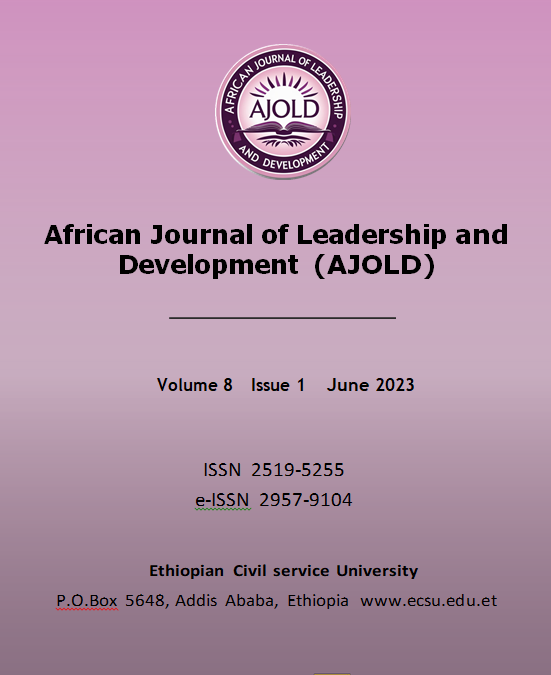The Effect of Leadership Competency Units on Organizational Effectiveness in Ethiopia: The Case of Federal Public Sector
DOI:
https://doi.org/10.63990/2023ajoldvol8iss1pp46-60Keywords:
leadership Competency units, Organization Effectiveness, Public SectorAbstract
This study aims at investigating the effect of the major leadership competency units on organizational effectiveness in the Ethiopian Federal Public Service. A corresponding set of seven hypotheses were formulated and tested to thereby refer and adopt models. The study involved 1,272 public servants from a sample of nineteen entities chosen on multi-stage systematic and simple random sampling bases of the lottery method. A five-point Likert type scale survey with 52 items, FGD’s and document analyses were employed. Quantitative-qualitative mixed; cross-sectional survey study design was used. The quantitative data was analyzed using descriptive and inferential statistics techniques of multiple linear regression method. The qualitative data was analyzed using narrative analyses. The result of the study showed that the leadership competency units identified by the FDRE Civil Service Commission Task Force somehow coincide with those under this study. About 52 percent of the variation in the dependent variable (overall organizational effectiveness of the FDRE public sector at federal level) was caused by the independent variables (intrapersonal, interpersonal, technical, direction setting, and career competencies) to this level; and about 48 other percent of the variation in the dependent variable (overall organizational effectiveness of the FDRE public sector at federal level) was attributed to other factors not studied by this research. The overall leadership competency units have significant effect on organizational effectiveness. While the descriptive analyses depicted that there is a slightly higher than average rating between 3.18 and 3.62 mean scores in all the six independent and the dependent variable; the qualitative data results aligned more to the regression analyses implying that the competency units identified positively explain the organizational effectiveness. The researchers, thus, suggested that interested competency assessors need to investigate the additional competency units that will have positive effect on organizational effectiveness like developing others’ leadership competencies for instance before using them for decisions of cases of promotion, demotion, and transfer of employees; and future researchers need to study competency units for none-leaders (employees).
Downloads
Published
How to Cite
Issue
Section
License
This work is licensed under a Creative Commons Attribution-NonCommercial 4.0 International License






